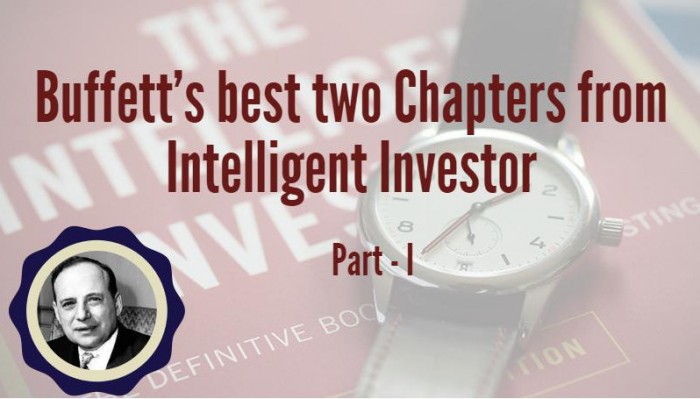Warren Buffett said-
Chapter 8 and 20 have been the bedrock of my investing activities for more than 60 years….I suggest that all investors read those chapters and reread them every time the market has been especially strong or weak
I totally agree with Mr. Buffett on this because chapter 8 discusses on market fluctuations while Chapter 20 is on the concept of margin of safety.
These two concepts are key to investing and every investor should read them as a bible.
The following are the list of important concepts which one must learn from chapter 8 of Intelligent investor:-
1. Fluctuation is a part and parcel of investing
The equity is certain to fluctuate in value over the years and it should be seen as an opportunity and profit from these pendulum swings rather than moving away from the market. As Warren Buffett said-
Be fearful when others are greedy and greedy when others are fearful
It’s very important for the investor to be prepared both financially and psychologically given that the fluctuation will take place sometime in future. However, one danger which could result out of this could be that you end with speculation. Benjamin Graham said-
If you want to speculate do so with your eyes open, knowing that you will probably lose money in the end
2. Buffet’s Ways to capture market fluctuations
The investor should try to use these fluctuations in his own favor which can be done in two possible ways-
(a) Timing– It involves action to buy or hold when the future course seems upward and sell when the future course looks downward which involves anticipation of the future action.
(b)Pricing– It involves buying stock when they are quoted below their fair value and to sell them when they rise above such value. Benjamin Graham said-
We are equally sure that if he places his emphasis on timing, in the sense of forecasting, he will end up as a speculator’s financial results
However, I partially do not agree with Benjamin Graham on his pricing strategy as I feel that during the bull phase, the price tends to trade far above its fair value. So as per his strategy if someone sells when price> fair value, he may lose the cream of his investments. Benjamin Graham said-
Timing is of great psychological importance to the speculator because he wants to make his profit in a hurry.
It is very important for the investor to be confident in his own prediction rather than getting swayed away in the brokerages forecast and act on their reports.
Read more: Top 5 investing lessons from Warren Buffett’s shareholders letters 2016
3. Few words on bull market and shrewd investor
Benjamin Graham discussed some characteristics of bull market discussed as under-
a. Historically high price level
b. High price/earning ratio
c. Low dividend yields as against Bond yields
d. Much speculation on margin
e. Many offerings of new common stocks issues of poor quality. Benjamin Graham defines shrewd investor as-
one who bought in a bear market when everyone else was selling, and sold out in a bull market when everyone else was buying
The smart investor should have a power to stop following the crowd and if he is a right kind of investor, he will obtain satisfaction from the thought that his operation is exactly opposite from those of crowd.
4. Successful businesses are prone to more fluctuations
It is often seen that more successful the company, the greater is the chance of fluctuations in the share price. Benjamin Graham said-
The better the quality of a common stock, the more speculative it is likely to be- at least as compared with the unspectacular middle-grade issues
This should be looked upon as positive as it provides an opportunity to an investor to buy quality stocks at a better price.
The author gave an example of A&P shares which was trading at Rs 494 in the year 1929. This company was the largest enterprise in America with a continuous and impressive record of large earnings for many years.
The stock gradually fell to a low of Rs 36 in the business recession and bear market of 1938 although the company’s earnings were as large as in previous years. The stock quoted at Rs 705 in 1961 indicating that the stock market often goes far wrong giving an advantage to the alert and courageous investor to utilize the market’s error in his own favor.
To know more about investing strategies used by Warren Buffett and Benjamin Graham you can enroll in Value Investing Strategies course on Elearnmarkets.com.
5. Buy right and sit tight
The investor holding sound stocks in his portfolio should never be concerned with big moves on either direction.
It’s important to remember that stable business always rises consistently over a period of time. Ben Graham said-
The primary cause of failure is that they pay too much attention to what the stock market is doing currently
The investor must keep in mind that market quotations are there for his convenience either to be taken advantage of or to be ignored.
The market’s job is to provide you with prices and your job is to decide whether it is to your advantage and act on them. Ben Graham said-
Never buy a stock immediately after a substantial rise or sell one immediately after a substantial drop
6. Ben Graham on some of the handicapped mutual fund managers
The problem with most of the mutual funds is that given the millions of dollars to invest, they end up owning the same few overpriced giants. Most of the funds are not allowed to invest in extremely beaten down small cap companies though it has huge potential and even the fund managers love the stock.
Many portfolio managers get bonuses for beating the market and even if some of the stocks work out poorly, no one will blame them since the situation is same all across the funds. It is often seen that most of the money flow into the fund in the bull phase leading the managers to buy more of the stocks they already own, driving prices to even more dangerous heights.
The reverse happens in the bear phase where investor asks for their money back when the market falls thus forcing the stock to come down to extremely cheaper price.
7. Investing appears some war or a sport on financial media
The best way of investing is to buy stocks every month given you have long-term horizon at least 25-30 years and do not sell unless you need the cash. Ben Graham said-
If you listen to financial TV, or read most market columnists, you’d think that investing is some kind of sport, or a war, or a struggle for survival in a hostile wilderness. But investing isn’t about beatings others at their game. It’s about controlling others at their own game. The challenge for the intelligent investor is not to find the stocks that will go up the most and down the least, but rather to prevent yourself from being your worst enemy- from buying high just because Mr. Market says Buy! and from selling low just because Mr. Market says Sell!.
In short, Investing is not about beating the market or others, rather it is about earning enough money to meet your need. It’s not about crossing the finish line faster than others but about finally crossing the line i.e. to reach the goal.
8. Psychology in case of financial loss
Psychology plays an important role in case of a very high volatility especially when the price falls drastically. Ben Graham said-
The brilliant psychologists Daniel Kahneman and Amos Tversky have shown that the pain of financial loss is more than twice as intense as the pleasure of an equivalent gain. Making $1000 on a stock feels great- but a $1000 loss yields an emotional wallop more than twice as powerful. Losing money is so painful that many people terrified at the prospect of any further loss, sell out near the bottom or refuse to buy more
Graham believed that investors would be better off if his stocks had no market quotation causing him to avoid the mental anguish due to fall in prices given the longer time frame.
In a series of remarkable experiments in the late 1980s, a psychologist at Columbia and Harvard, Paul Andreassen, showed that investors who received frequent news update on their stocks earned half the returns of investors who got no news at all.

BOTTOMLINE
We hope that you got a clear understanding of the important concepts given by Warren Buffett and discussed in this blog.
To know about the lessons from Chapter 20 of Intelligent Investor, read Part-II of this blog.
You can use our Stockedge app or website to get cutting-edge over others in both short-term trading and investing. Here, you not only get data one particular place but can also create your own combination scans based on your own technical and fundamental parameters.










I have read Intelligent Investor and I agree that chapter 8 and 20 is a must read.
Moreover, point 4 and 8 of your writeup is very important for any investor.